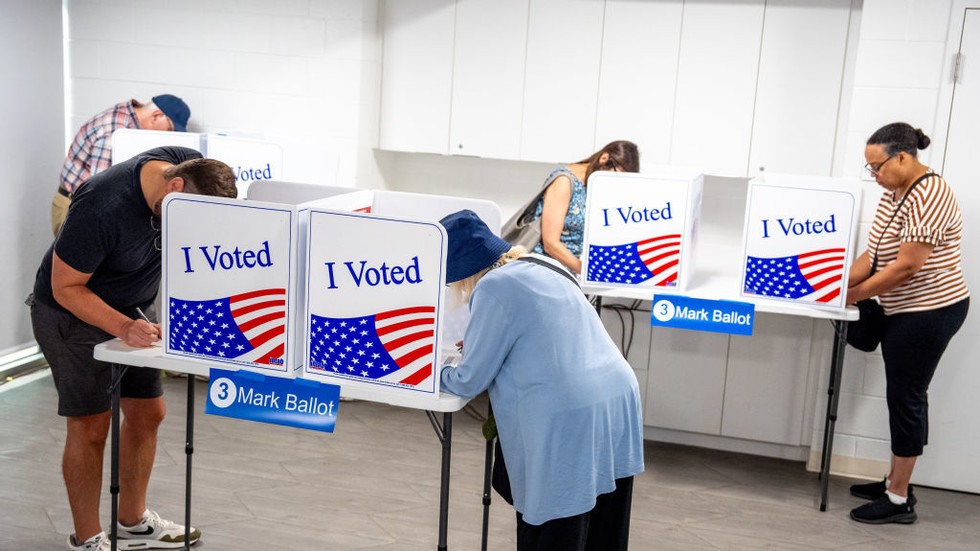In a significant ruling, the U.S. Supreme Court has allowed Virginia Governor Glenn Youngkin to proceed with a voter roll purge involving 1,600 individuals who could not confirm their citizenship. This decision represents a win for Republicans, who have consistently advocated for stricter voter verification processes. The Supreme Court’s conservative majority supported Youngkin’s executive order, which he implemented in August, amidst lawsuits from pro-immigrant organizations challenging the legality of the purge. A district court initially sided with these activist groups, stating that systemic changes to voter rolls should not occur just before an election. However, the appeals court later reversed that decision, setting the stage for the Supreme Court’s intervention, which ultimately approved the governor’s plans.
Despite the victory in Virginia, recent events revealed a series of setbacks for the GOP in key battleground states. In North Carolina, a federal court blocked a Republican initiative to remove 225,000 voters from the rolls due to claims of lacking identification. This decision could impact the dynamics of an election that is currently too close to call, with Trump leading Harris by a slim margin. Republicans have argued that Democrats oppose voter ID laws because they rely on votes from non-citizens, but this court ruling challenges that narrative, potentially ensuring greater participation among eligible voters. It highlights the contentious atmosphere surrounding voter registration and identification laws that resonate across the political spectrum.
In Pennsylvania, the judicial landscape mirrored that of North Carolina, as a district court dismissed a GOP request to segregate overseas and military ballots. The argument presented by Republican lawmakers hinged on safeguarding the election from potentially ineligible votes, suggesting that the absence of identification requirements could invite fraudulent ballots. With Trump leading Harris in the state by nearly a point, the ruling to keep these ballots integrated could maintain electoral equity and transparency, emphasizing the importance of overseas voter rights in the electoral process. This case underscores the ongoing debates about election security and accessibility in the context of military and overseas voting.
Meanwhile, the Nevada Supreme Court delivered a ruling that could have critical implications for mail-in voting, determining that ballots may be accepted for up to three days after election day, regardless of postmarking. This decision follows Trump’s allegations from the 2020 election, which he claimed were characterized by irregularities regarding late-arriving mail-in ballots. The current polling in Nevada shows Trump barely ahead, suggesting that the ruling could play a crucial role in determining how voters approach mail-in voting amid allegations of past election fraud. As in North Carolina and Pennsylvania, the legal landscape is shifting, balancing the need for voter access against concerns of election integrity.
Trump’s reactions to these developments have been notable, with calls for his supporters to report any suspected cheating. His comments reflect a broader strategy to galvanize his base around election integrity issues, especially as the midterms approach. Claims of fraud and election irregularities resonate strongly within his supporter base, steering the narrative around perceived vulnerabilities in electoral systems in battleground states. While GOP efforts have been met with judicial resistance in these states, Trump’s campaign seems increasingly focused on capitalizing on fears of disenfranchisement and electoral malpractice.
Overall, the juxtaposition of victories and defeats for the GOP across various courts illustrates a complex landscape of electoral law and voter access. The Supreme Court’s decision in Virginia is significant within its context, but it is overshadowed by the broader implications of judicial outcomes in battleground states like North Carolina, Pennsylvania, and Nevada. These states are pivotal for both parties in upcoming elections, and the rulings could influence not only voter turnout but also the ongoing dialogue about voter rights, identification laws, and election security. As the political landscape continues to evolve, the battles over voter access and election integrity will undoubtedly remain at the forefront of American politics.

